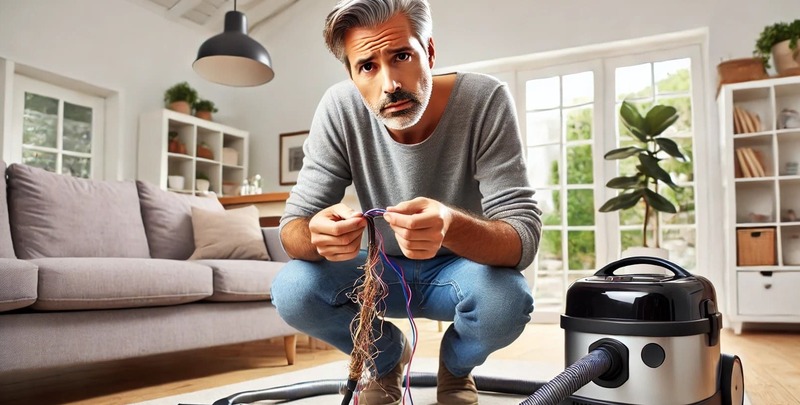
Understanding Why Your Appliance Cord Gets Hot: Keep Your Home Safe
Have you ever noticed your appliance cord feeling unusually hot to the touch? While some warmth is normal, especially for high-powered devices, a cord that gets too hot could signal a bigger issue.
It’s something many of us overlook, but understanding why this happens is essential for your safety and the health of your appliances. Overheating cords can lead to potential hazards like electrical fires, damage to your device, or even personal injury.
Whether it’s caused by damaged wiring, overloading, poor appliance installation or a poor-quality extension cord, knowing the root of the problem can help you take the right steps to fix it. In this blog, we’ll explore the common reasons behind hot appliance cords, the risks they pose, and what you can do to keep your home safe.
Is It Normal for Appliance Cords to Get Warm?
It’s not uncommon for appliance cords to feel slightly warm during use, and in many cases, this is perfectly normal. When electricity flows through a cord, a small amount of heat is generated due to electrical resistance.
For example, high-powered appliances like heaters, microwaves or irons may naturally cause their cords to feel warm while they’re operating. However, the key is understanding the difference between “warm” and “hot”.
A cord that feels uncomfortably hot to the touch or shows signs of overheating − such as melting insulation, discolouration or a burning smell − is not normal. These signs often point to an underlying issue that needs attention. Possible causes include damaged wiring, an overloaded circuit, or an appliance drawing more power than the cord is designed to handle.
To determine whether the warmth is normal, consider the appliance’s power usage and ensure you’re using the correct cord or extension. If a cord consistently gets hot or you’re unsure, it’s best to unplug the device and inspect the cord or consult a professional. Ignoring the issue could lead to risks like electrical fires or damage to your appliances.

Common Reasons for Overheating Cords
If your appliance cord is overheating, there’s likely an underlying issue that needs attention. Here are the most common causes of hot cords:
- Damaged or frayed wiring: Over time, cords can suffer wear and tear, exposing the internal wires. This can lead to increased resistance and overheating, posing a serious fire risk.
- Overloaded circuits: Plugging multiple high-powered devices into the same outlet or power strip can cause an overload. This excessive demand on the circuit creates heat, which travels through the cords of your appliances.
- Loose connections: If a plug doesn’t fit snugly into the power outlet, it can create resistance at the connection point. This resistance generates heat, leading to overheating cords and potentially damaging both the appliance and outlet.
- Using an incorrect extension cord: Not all extension cords are made for heavy-duty appliances. Using a lightweight cord for devices like heaters or air conditioners can cause the cord to overheat because it isn’t designed to handle the power demand.
- Faulty appliance: Sometimes, the problem lies within the appliance itself. Internal wiring issues or malfunctioning components can cause cords to heat up during use.
Identifying the root cause early is essential to avoid safety risks like electrical fires or appliance damage.
Dangers of Hot Appliance Cords
A hot appliance cord is more than just an inconvenience − it’s a warning sign of potential electrical hazards. Ignoring this issue can put you, your home, and your appliances at serious risk.
One of the biggest dangers of a hot cord is the increased risk of electrical fires. When a cord overheats, the insulation around the wires can melt or degrade, potentially sparking a fire.
Another danger is the risk of electric shock. Damaged or frayed cords, which often accompany overheating, can expose live wires. Accidentally touching these wires could result in serious injury.
Overheating cords can also cause damage to your appliances, as the fluctuating electrical current may lead to malfunctions or shorten their lifespan.
Additionally, cords that consistently overheat indicate underlying issues, such as overloaded circuits or poor-quality wiring, which may affect other parts of your electrical system. The longer you ignore the problem, the greater the risk becomes.
If you notice your appliance cords getting hot, don’t delay in addressing the issue. Unplug the device, inspect the cord for damage, and seek professional help if needed. It’s always better to be safe than sorry when it comes to electrical safety.

How to Diagnose the Problem
If your appliance cord is getting hot, it’s important to pinpoint the cause before continuing to use it. Here are some simple steps to help you diagnose the problem:
- Inspect the cord for damage: Check for visible signs of wear and tear, such as frayed wiring, cracks, or melted insulation. Any damage to the cord can lead to overheating.
- Test a different outlet: Plug the appliance into another outlet to rule out a faulty socket. If the cord heats up again, the problem may lie with the appliance or the cord itself.
- Check for overloading: If the appliance is plugged into a power strip with other devices, unplug them to see if reducing the electrical load solves the issue.
- Feel the plug and outlet: If the plug or outlet is warm to the touch, it might indicate a loose connection or an overloaded circuit.
- Inspect the appliance: Look for signs of malfunction within the appliance, such as unusual noises or inconsistent performance. These could indicate internal electrical issues.
- Use a multimeter: If you’re comfortable with tools, use a multimeter to measure the voltage and current flow to ensure they’re within normal ranges.
If these steps don’t identify or resolve the issue, it’s time to call a professional.
Solutions to Prevent Overheating
Preventing your appliance cords from overheating is essential for maintaining safety and extending the lifespan of your devices.
Here are some effective solutions:
- Replace damaged cords: If a cord is frayed, cracked, or shows signs of wear, replace it immediately. Damaged cords are a major cause of overheating and electrical hazards.
- Use the right extension cord: Ensure you’re using an extension cord rated for the appliance’s power requirements. High-powered devices like heaters and air conditioners need heavy-duty cords.
- Avoid overloading outlets: Plugging multiple appliances into a single outlet or power strip can overload the circuit, causing cords to heat up. Spread out your appliances across different outlets.
- Ensure proper plug fit: Loose plugs can create resistance and heat. Make sure your appliance plugs fit snugly into outlets to avoid poor connections.
- Unplug appliances when not in use: This simple habit reduces the risk of overheating and saves energy.
- Upgrade old wiring: If you live in an older home, consider upgrading your electrical system. Outdated wiring may not handle modern power demands efficiently.
- Schedule professional inspections: Regularly have your appliances and electrical system inspected by a licensed electrician to catch potential issues early.
Taking these steps can help ensure your appliances operate safely and efficiently.
When to Call a Professional
If your appliance cord feels hot and you’ve ruled out obvious issues like overloading a power strip or using the wrong type of extension cord, it’s time to consider calling a professional.
While some minor electrical problems can be fixed with a bit of DIY troubleshooting, hot cords can indicate more serious issues lurking in your home’s electrical system.
You should call an electrician immediately if you notice signs like a burning smell, melted or discoloured insulation on the cord, or if the cord remains hot even after unplugging and re-plugging the appliance. These could be signs of damaged wiring, a short circuit or overloaded circuits, all of which are fire hazards.
If multiple cords or outlets in your home are overheating, it could signal a bigger issue with your home’s wiring or electrical panel. A licensed professional can inspect your system, identify the root cause and ensure everything is safe and up to code.
Remember, electrical problems aren’t something to take lightly. When in doubt, don’t risk it − reach out to an expert to keep your home and family safe.

Don’t Let the Sparks Fly
A hot appliance cord is a small issue that can lead to big problems if ignored. While slight warmth might be normal for some devices, overheating cords should never be taken lightly.
They could signal damaged wiring, overloading, or other serious electrical issues that pose risks like electrical fires, appliance damage or even personal injury.
By understanding the common causes and dangers, you can take proactive steps to keep your appliances and home safe. Always inspect cords for damage, use the correct outlets and extension cords, and avoid overloading circuits.
If the problem persists or you notice warning signs like a burning smell or melted insulation, don’t hesitate to call a licensed electrician. A little attention now can prevent bigger headaches − and hazards − later.
Please note: This information is provided for advice purposes only. Regulations differ from state to state, so please consult your local authorities or an industry professional before proceeding with any work. See our Terms & Conditions here.